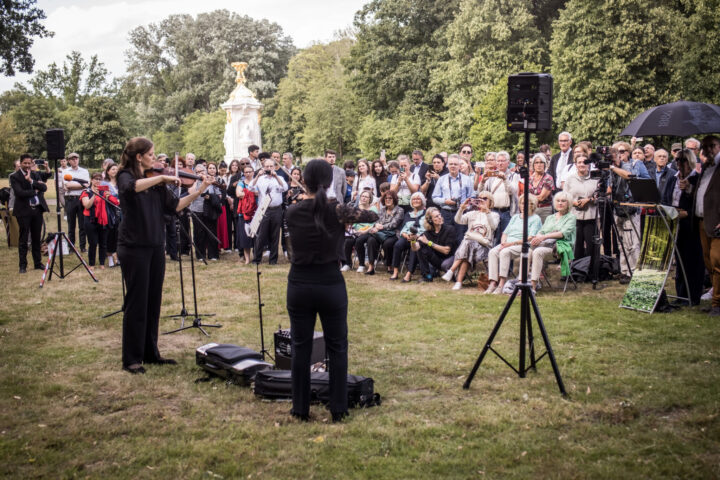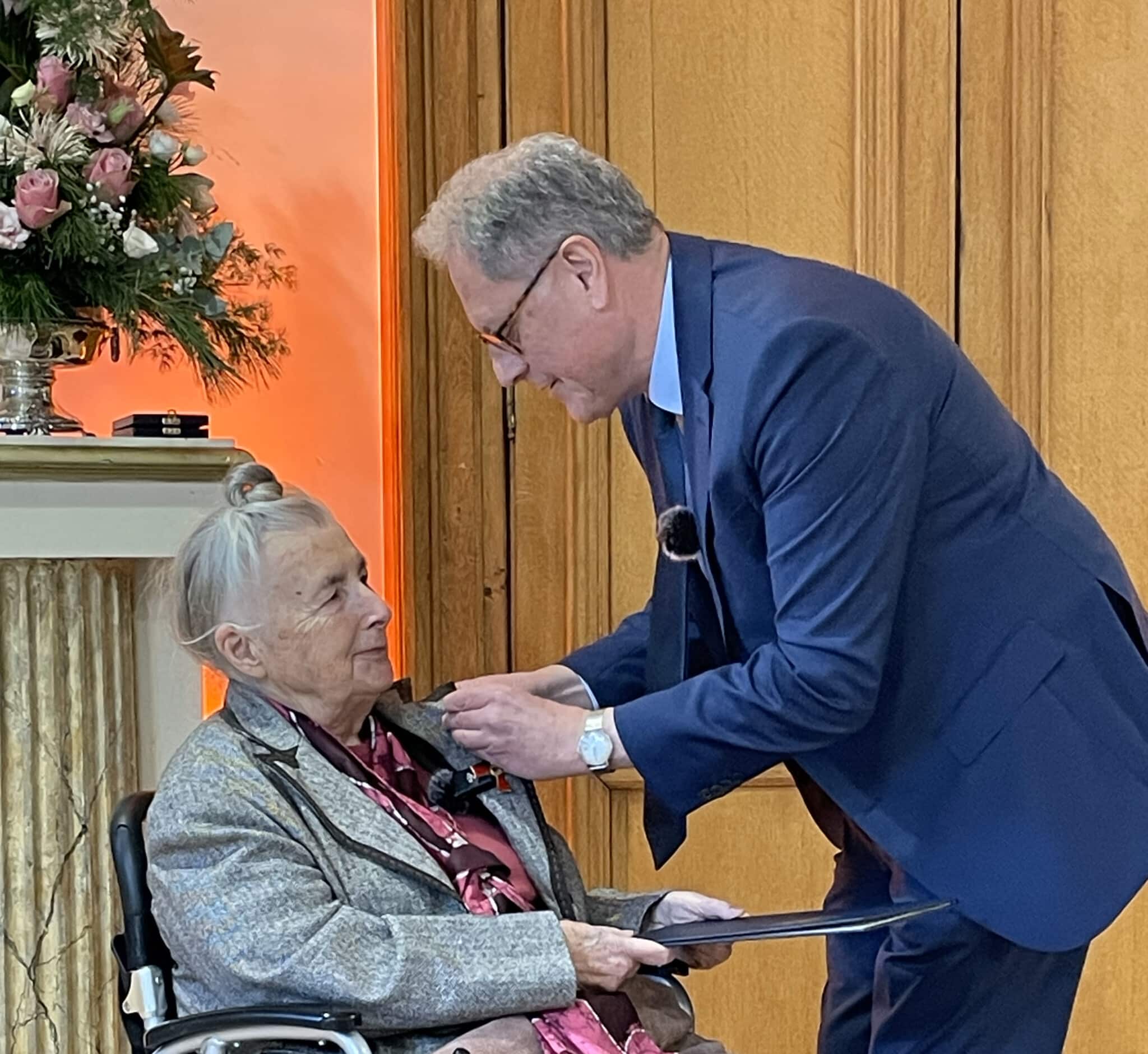
June 24, 2025 marked the 92nd anniversary of the ban on Bible Students (Jehovah’s Witnesses) in Prussia. The Foundation Memorial to the Murdered Jews of Europe and the Arnold Liebster Foundation jointly hosted the commemoration. The event took place at the site of the planned memorial for Jehovah’s Witnesses persecuted and murdered under National Socialism in Berlin’s Tiergarten, not far from the Goldfish Pond.
In 1936, the Gestapo carried out a comprehensive wave of arrests against leading members of the religious community in Germany. One of these targeted arrests took place on August 22, 1936 at the goldfish pond in Berlin’s Tiergarten.
Review of the commemoration of the ban on Bible Students
The public memorial service took place as announced on June 24, 2025 at 5 p.m. in Berlin’s Tiergarten park. Over 150 guests took part on site, while around 1,200 people followed the commemoration live via a Zoom broadcast.
The full recording of the memorial service is available on YouTube:
- Link to the recording of the memorial service on the YouTube channel of the Arnold Liebster Foundation
- Link to the recording of the commemorative event on the YouTube channel “Culture & Art”
Fan Wang (violin) and Annika Reuter (viola) provided the musical framework for the memorial service.
Uwe Neumärker, Director of the Foundation Memorial to the Murdered Jews of Europe, welcomed the participants and paid tribute in his speech to the extraordinary courage of the Bible Students in their fight against National Socialism. The German government had recognized this resistance by deciding to erect a memorial. Neumärker emphasized that the Jehovah’s Witnesses refused to give the Hitler salute or perform military service. It was particularly remarkable that they helped other people – regardless of their religion, ideology, origin or skin color. “They supported Jews, communists, blacks, Sinti and homosexuals,” explained Neumärker. “People were at the center of their actions.” This behavior is reminiscent of Article 1 of the Basic Law: “Human dignity is inviolable.” The Jehovah’s Witnesses’ resistance was an act of freedom – the freedom to make their own decision.
Dr. Christl Wickert then spoke about the special role of women among the Bible Students, who made up around 45 percent of the religious community. She described the fate of Hildegard Seliger, the only woman who was directly involved in the Goldfish Pond campaign. Seliger was arrested on August 22, 1936 and passed through the Lichtenburg and Ravensbrück concentration camps before she was forced to take part in the death march to Schwerin. “She was persecuted again in the GDR,” Wickert reported. “She and her husband were imprisoned for a total of 40 years – both in the German Reich and in the GDR.”
Wickert explained that in the beginning, women were rarely arrested by the National Socialists and took on important tasks: They conducted Bible studies, hid literature in baby carriages, baptized and thus replaced arrested men. In the second half of the 1930s, the Gestapo also arrested Jehovah’s Witnesses. In the concentration camps, they refused to work to support the war effort, held secret devotions and were appreciated by other prisoners for their compassion.
Many female biblical scholars were imprisoned in Ravensbrück, the largest concentration camp for women. At the beginning they were particularly badly mistreated, but later the Nazis recognized their reliability and used them for work outside the camp as they did not escape.
Wickert cited Käthe Neumann, a “first-degree half-breed” who was deported to Ravensbrück in 1943, as another example. Jehovah’s Witnesses made sure that Neumann no longer had to do hard labor due to her typhoid fever. This experience and the solidarity among the Witnesses moved her so deeply that she joined the religious community in the summer of 1945. She and her husband were also later imprisoned in the GDR.
Wickert concluded with a reference to the Basic Law, which is based on the experiences of the Nazi era. She quoted Article 4: “Freedom of faith, conscience and religious and philosophical beliefs shall be inviolable” and “No one shall be compelled against his conscience to do military service with arms.” These fundamental rights are more important than ever due to current events, as there is a risk that the democratic constitution will be indirectly undermined. Wickert concluded by emphasizing that defending the constitution is a task for all citizens.

Remembrance of the Bible Students arrested at the Goldfish Pond

The moving conclusion was the reading of fragments of memories by four Berlin students. They read out 13 short biographies of Jehovah’s Witnesses who had met regularly at the Goldfish Pond and led the work of Jehovah’s Witnesses in the German Reich underground:
Heinrich Dietschi, Erich Frost, Paul Großmann, Georg Klohe, Otto Kours, Albert Kuczewski, Georg Rabe, Wilhelm Ruhnau, Hildegard Seliger, Ernst Seliger, Ernst Varduhn, Fritz Winkler and Emil Zellmann.
These names are representative of the many Jehovah’s Witnesses who were imprisoned throughout Germany during the 1936 wave of arrests because they remained true to their religious beliefs. At least 17 of those arrested died as a result of torture.
You can find out more about the persecution of Bible Students by the Nazis in the hr2 podcast “Camino” entitled “Geheimtreffen am Goldfischteich”, which tells the moving story of the persecuted Jehovah’s Witnesses: Link to the podcast “Geheimtreffen am Goldfischteich“.
Outlook: Inauguration of the memorial in 2026
Those interested can already make a note of June 24, 2026: On this day, the memorial to the Jehovah’s Witnesses persecuted and murdered under National Socialism will be dedicated at the Goldfish Pond – exactly 93 years after the denomination was banned.
Background
The Christian denomination of Jehovah’s Witnesses, which also called itself the Serious Bible Students, was systematically persecuted in Germany from 1933 and from 1938 in Nazi-ruled Europe.
Almost 14,000 Jehovah’s Witnesses – women and men – were imprisoned, including 4,200 in concentration camps, where they were stigmatized with a “purple triangle.” At least 1,750 Jehovah’s Witnesses lost their lives. Among them is the largest group of conscientious objectors under National Socialism. Her fate contributed to the enshrinement of the basic right to conscientious objection in the Basic Law. Jehovah’s Witnesses were also persecuted under communism and in many authoritarian states in the 20th century, with victims of National Socialism again being arrested and harassed.
On June 22, 2023, the German Bundestag unanimously approved a memorial to the Jehovah’s Witnesses persecuted and murdered under National Socialism under the umbrella of the Foundation Memorial to the Murdered Jews of Europe. Further information: Bundestag resolution on the establishment of a memorial for Jehovah’s Witnesses






